- Track 29’s ranking on the Oldometer: 6/10
- Gary Oldman character quality: If Martin were written to be real flesh and blood, this character would not make a whit of sense, however as we are not sure how much of him is real, Oldman has the chance to get weird, and boy does he. Martin is the best aspect of the film.
- Does Gary die in this one? No. Yes? Was he ever alive? This is up for debate.
Track 29 (1988), its title a reference to the old tune “Chattanooga Choo-Choo,” opens with an almost painfully young and wiry Gary Oldman as the very unhinged, very British Martin, who seemingly materializes on a backroad in North Carolina. He wears a pair of sunglasses in the fashion of John Lennon’s famous coke-bottle spectacles, and as he holds his thumb out for a ride, the soundtrack kicks in with Lennon himself wailing his signature song “Mother.” Suddenly, Martin throws his head back and screams “MUMMEEEEEEEEEE!” to the heavens for no apparent reason. Batten down the hatches, director Nicolas Roeg warns us. You’re about to see some weird stuff.

Unless you’re really into movies, you probably haven’t heard much about Track 29. Its appeal was probably limited from the get-go, and since its release it has, I imagine, faded into near-obscurity. After watching it, I can see why it’s not exactly celebrated, despite the fact that it boasts an early, totally go-for-broke lead performance from Baby Gary Oldman and a queasy supporting turn by Christopher Lloyd (forever Doc Brown to most of us). Nicolas Roeg, who is also responsible for The Man Who Fell To Earth (Bowie!), Don’t Look Now (Donald Sutherland! Dwarves!), and The Witches (Anjelica Houston forever!), clearly a respectable director, seems to go out of his way to make this story unpleasant. Still, there’s something outlandishly appealing to it, in a chintzy kinda way.
The fact that this movie is an adaptation of a play called Schmoedipus, which once starred a tiny Tim Curry and was written by Dennis Potter (he of Pennies from Heaven and Singing Detective fame), should tell you a great deal. Also, here’s bit of trivia for you: the film was produced by George Harrison, of all people.

The main character is Linda, played, unfortunately, by Theresa Russell. Linda is a repressed Southern housewife who keeps the TV on 24/7, works out in her fabulous 80’s leotard, and hoards a collection of freaky baby dolls, some of whom sleep in the bed that she shares with her husband, Henry Henry (a reference to Nabokov’s Humbert Humbert? But WHY?). Dr. Henry Henry, played by Lloyd, is also creepily infantile and obsessed with his (admittedly impressive) model train collection. His other passion is being spanked by his equally strange nurse. Also, he says things like “You know you’re my Little Choo-Choo.”

Linda, it turns out, was attacked by a carny (Gary Oldman again… with a bouffant?) when she was 15, which produced a baby that she was forced to give up. At least, we think that’s what happened. It could be that none of this true, or that she was never pregnant, or that she terminated her pregnancy or even lost the baby. What IS clear is that she’s losing her mind from boredom, her sexually frustrating marriage, her desire for a baby, and, maybe, the trauma of her teens and the guilt over losing her first child.
Martin appears to Linda when he first meets her at a diner, but we learn later that no one else can see him; when Linda and Martin go to a restaurant together it is revealed that Linda is talking only to herself when she thinks she is talking to Martin. After that, Martin and Linda get drunk at her house (at least I think that’s what happens) and it gets uncomfortably sexual. This, of course, would be disturbing if Linda were indeed Martin’s mother, but we are now to believe that the Martin we are privy to is solely in the woman’s head, so all we’re picking up on is that she’s mentally ill.

I’d speculate that Linda’s neuroses probably boils down to her want for both a lover as well as a child. As her flashback interactions with Carny Gary suggest, she’s torn between the two concepts she has developed of men: macho, mysterious and violent vs. painfully dull and juvenile. Emotionally paralyzed, she lazes around, moaning about how much her life sucks for pretty much the rest of the film while Oldman cranks up the weird by flinging himself back and forth between inappropriate seduction mode and an imitation of a psychotic toddler.
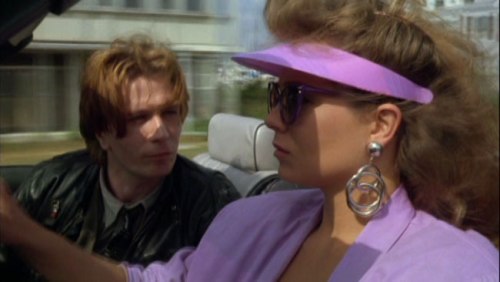
Let’s switch gears. I’m not sure why, but something about this relationship made me think about Plato’s The Symposium. Stay with me, here. In Symposium, the great philosopher (and very excellent dude) Socrates (and a bunch of other guys) talk about the nature of love, and eventually Socrates blows everyone out of the water (as usual) by telling them that love is more than just beauty as we think of it, but rather the journey to The Beautiful. It’s not so much the having, Socrates says, but in the pursuit and perpetual possession, the wanting-to-have that builds something terrific (he also cites his source, a woman named Diotima, who once explained all of this to him. Go Diotima).
You might start out, Socrates suggests, with the attraction to a beautiful person, but then you must keep climbing the “love ladder” (I don’t think he actually called it this, but if the shoe fits..). On the way up, you pass rungs that represent the love of all physical beauty, the love of the soul and intellect, an appreciation for the law (of course Plato worked that one in), the adoration of wisdom, and one thing leads to another until eventually you level up to true Beauty ITSELF, which has something to do with God and the universe, I think. I know there’s much more to this, but give me a break, Plato scholars (I have too much pride to look it up. Also, I’m lazy).
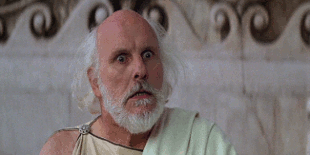
In this case, I’m going to guess that Linda has a deep-seated need for this real love which, for her, might be Motherhood (if her garish baby dolls are any indication, that’s the endgame), and her attempts to cash in on this desire have just not worked out. Henry Henry refuses to have a baby with her, she harbors deep regret for the “abandonment” of her kid, and now she’s trying to assemble this “true love” thing with her broken mind. Linda wants to jump ahead (jump the track, if you will, heh heh) to the kind of love that Socrates describes, the sort that would grant her the higher state of desiring beauty (a life and relationship with her child) but she’s gone in reverse with too much focus on the concept of a person. To make matters worse, her homing device isn’t picking up on an object for her affections, so she invents one. Sadly for her, her understanding of love is still “common” and attached to the adolescently sexual (thanks to her assault), so Martin is to her a box full of puzzle pieces– just a beautiful figment that she can’t put together.

Despite the peculiarities of Linda and Martin’s situation, the weirdest thing about Track 29 is that I really enjoyed it. It’s a tad grotesque, but the combination of Russell, who is absolutely God-awful (and would be with or without the dreadful Southern accent she adopts) and Oldman, who is over-the-top in the best possible way (were he not over-doing it, honestly, this movie would dissolve into nothing but dull depravity), is at times so absurd that I found it hysterical.
The movie has a B-quality, which, combined with all of the implied perversity (which honestly never gets perverse in say, a Cronenberg way), reminds me of the “sexploitation” movies of the 50’s. Babydoll by Elia Kazan comes to mind, and that’s not necessarily a bad thing. Yes, Track 29 is a bit deviant and no, it’s not logical, but is that so terrible? Filmmaker David Lynch once said that he found it amusing when audiences wanted their movies to make sense. After all, he reasoned, life doesn’t make a whole lot of sense, either (just look at… everything about the presidential race in the US right now).

To illustrate: there’s a scene in which Oldman bursts through Lloyd’s train set from underneath, as if the miniature town were a giant cake and Gary has become Cathy Selden, kicking off her “All I Do is Dream of You” number. He then proceeds to clamber all over the tiny village, Godzilla-style, picking up the toys and smashing them together with manic glee. Later, he pops out of a wardrobe, naked, with a ridiculously shiny knife and attacks Henry Henry, while comically vibrant blood spurts every-which-way (“I don’t think Martin LIKES Henry,” Linda murmurs to herself, flummoxed). He says things like “What kind of Mummy are you, anyway?!” and “NO clinics! No medical facilities what-so-everrrr!!!” as he attempts to drive Linda’s car off the road. I can’t lie. I laughed very hard at all of this. In my room. Alone.
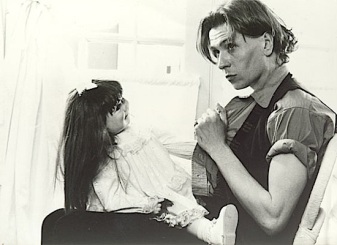
But WHY do I like this? It’s so… ugly. Since the themes of rape and motherhood are not given real weight, there’s no moral tension here, just a few sick people doing dumb things. Isn’t it true, though, that we consumers sort of LIKE ugliness? Not in the mainstream, maybe, but when you think about all the cult classics out there, many of them unite audiences who revel in the lame and gross.
Look at John Waters, for example, an idolized filmmaker who built his empire on dog poo (literally) and the campiness of drag queens. Generation X’ers like Quentin Tarantino model their high quality work, unapologetically, on the cheapness of exploitation movies (which include the subgenres of sexploitation and blaxploitation), many which fall under the umbrella of grindhouse double-bills (Tarantino and Robert Rodriguez even made a joint project trying to directly imitate such creations). I don’t know anyone who doesn’t like Mystery Science Theater 3000, the series in which comedians (okay, one comedian and several robots) give commentary on hellaciously terrible films from the past. People eat failed, melodramatic creations like Mommie Dearest right up when such things should never have seen the light of day. Rocky Horror Picture Show, the biggest cult movie there ever was, is certainly not beloved because it’s Beautiful.
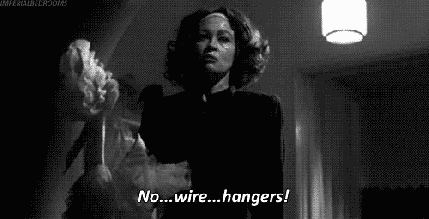
I don’t mean to look down on people who like those things. Like I said, I enjoyed this movie and I like other cult favorites too, like the aforementioned whackadoo Babydoll, Attack of the 50 Foot Woman, Freaks, Harold and Maude, Ed Wood movies, etc, but if love, as Socrates suggests, is the quest for wisdom and beauty, then I wonder if our tendency to revel in ugliness should be exchanged for challenging it. Since we like these movies so much, what would we get out of our time spent with them if we stopped merely steeping ourselves in the weird and dirty and looked at what exactly it is about this kind of work that pulls us in?
For me, it’s that I love to laugh. I love absurdity especially, it brings lightness to me when I find myself feeling heavy, and that is a good thing. It would seem then, ironically, at times the ugliness which I have detailed here sort of brings about what Socrates once described as a step on Diotima’s Ladder of Love (bit of a Lou Reed sound to that, isn’t there?).
Love does what Linda can’t manage; it starts with something diverting and climbs its way up to the appreciation of all law, wisdom, and beauty. Enjoying an ugly (or, preferably, an aesthetically pleasing) film for purely superficial reasons is fine, but it’s just the beginning, and it may limit you from knowing the film and knowing yourself. But if you allow it to lead you, the viewer, to an understanding or appreciation beyond the (in this case, bizarrely) entertaining elements of a movie’s constricted parameters, perhaps, just perhaps, it’s given you a boost up the Love Ladder. If I have appreciation not for Track 29 as a work of art, but for the belly laugh that insane Baby Gary Oldman gives me whilst he stomps all over Doc Brown’s Tiny Train Town like it’s Tokyo in the 50’s, is it that I have a grasp on REAL LOVE?
Well, no. That’s ridiculous. But it’s a start.
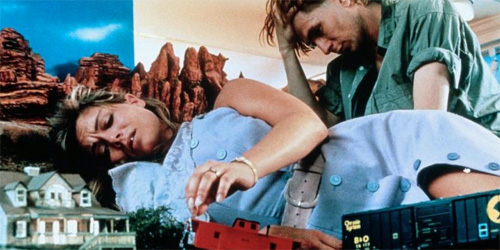


This is just so great. I’ve been spending a lot of time (as you know) taking a hard look at the entertainment I take in, thinking about why, what’s good about it, what’s not. This is a great part of that ongoing conversation.
Also, the HEADBAND COMMENT KILLED ME. My gosh. Your captions are GOLD.
LikeLiked by 1 person
Yeah, I think a good deal about the artist’s responsibility when it comes to art and entertainment, but I had never paused before to think about the ins and outs of “ugly” filmmaking, which, though sometimes the two go hand in hand, is different from “dark” stuff.
Annnnd I’m glad someone appreciates my sense of humor. Aside from me.
LikeLike
Hahaha, you used the Odometer! I’m helping!
Seriously though, this blog is turning out great. 10/10, will read again
LikeLike
Of course! The Oldometer is where it’s at.
Thanks for reading, man!
LikeLike
glad you were able to work “The 50 Foot Woman” in there somehow. 🙂
LikeLike
Yessssss. I was actually pleased with my Singin’ in the Rain reference, too.
LikeLiked by 1 person
I like what you say about Socrates and Diotima and the nature of love and wanting to have. You should include stuff like that in every post!
LikeLiked by 2 people
Glad you liked that! Only a crazed Baby Gary can bring out my appreciation for philosophy, apparently.
LikeLike